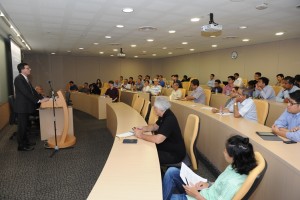Lecture Abstract:
Much of the current discussion of U.S.-China relations focuses on what scholars of international politics would call the structural determinants of their relationship, whether through the application of models of realpolitik (such as the “power transition” between established and rising powers) or models drawn from political economy (such as the “unbalanced interdependence” between economies with chronic trade and capital account imbalances). As valuable as these models are, they tend to overlook the socio-cultural aspects of the relationship: the ways in which elites and publics in the two countries view themselves, each other, and the relationship between them. But the examination of this additional dimension raises an intriguing question: are the two countries different, or are they actually surprisingly similar? And what is the impact of those similarities and differences on their relationship?
About the Speaker:
Harry Harding is concurrently a University Professor and Professor of Public Policy at the University of Virginia and a Visiting Professor of Social Science at the Hong Kong University of Science and Technology. He is a specialist on Asia and U.S.-Asian relations, with a particular interest in China. In addition to several edited volumes and numerous academic articles and chapters, his major publications include Organizing China: The Problem of Bureaucracy, 1949-1966; China’s Second Revolution: Reform after Mao; A Fragile Relationship: the United States and China since 1972; and the chapter on the Cultural Revolution in the Cambridge History of China.
Harding served as the founding dean of U.Va.’s Frank Batten School of Leadership and Public Policy between 2009 and 2014. Before joining the Batten School, he held faculty appointments at Swarthmore College (1970-1971) and Stanford University (1971-1983), and was a Senior Fellow in the Foreign Policy Studies Program at the Brookings Institution (1983-1995). From 1995 to 2005 he was Dean of the Elliott School of International Affairs at the George Washington University, and from 2005 to 2007 was Director of Research and Analysis at Eurasia Group, a political risk research and advisory firm based in New York.
Harding has been a consultant to several multi-national corporations and agencies of the U.S. government, and has served on the boards of numerous educational and non-profit institutions, the U.S.-China Joint Commission on Science and Technology, and the U.S. Defense Policy Board. He has helped design and conduct executive education programs for the Aspen Institute, the Salzburg Seminar, and the Leadership and Public Policy Program at HKUST, and has spoken at the World Economic Forum in Davos, the Shangri-La Dialogue in Singapore, and the School of International Futures at Wilton Park. He also organized a bilateral, Track Two Japan-U.S. dialogue on China for the Japan Institute of International Affairs and a subsequent series of trilateral dialogues between the JIIA, the Chinese Institute for International Studies, and a variety of American co-sponsors. He presently helps lead a trilateral U.S.-Russia-China dialogue on the policy issues at the intersection of international finance, energy, and climate change, funded by the Carnegie Institution, that also includes participants from India and the EU.
A graduate of Princeton in public and international affairs, he holds a Ph.D. in political science from Stanford University, and received the Walter J. Gores Award for Excellence in Teaching from Stanford.



 Add to Google calendar
Add to Google calendar
 Add to Outlook calendar
Add to Outlook calendar

